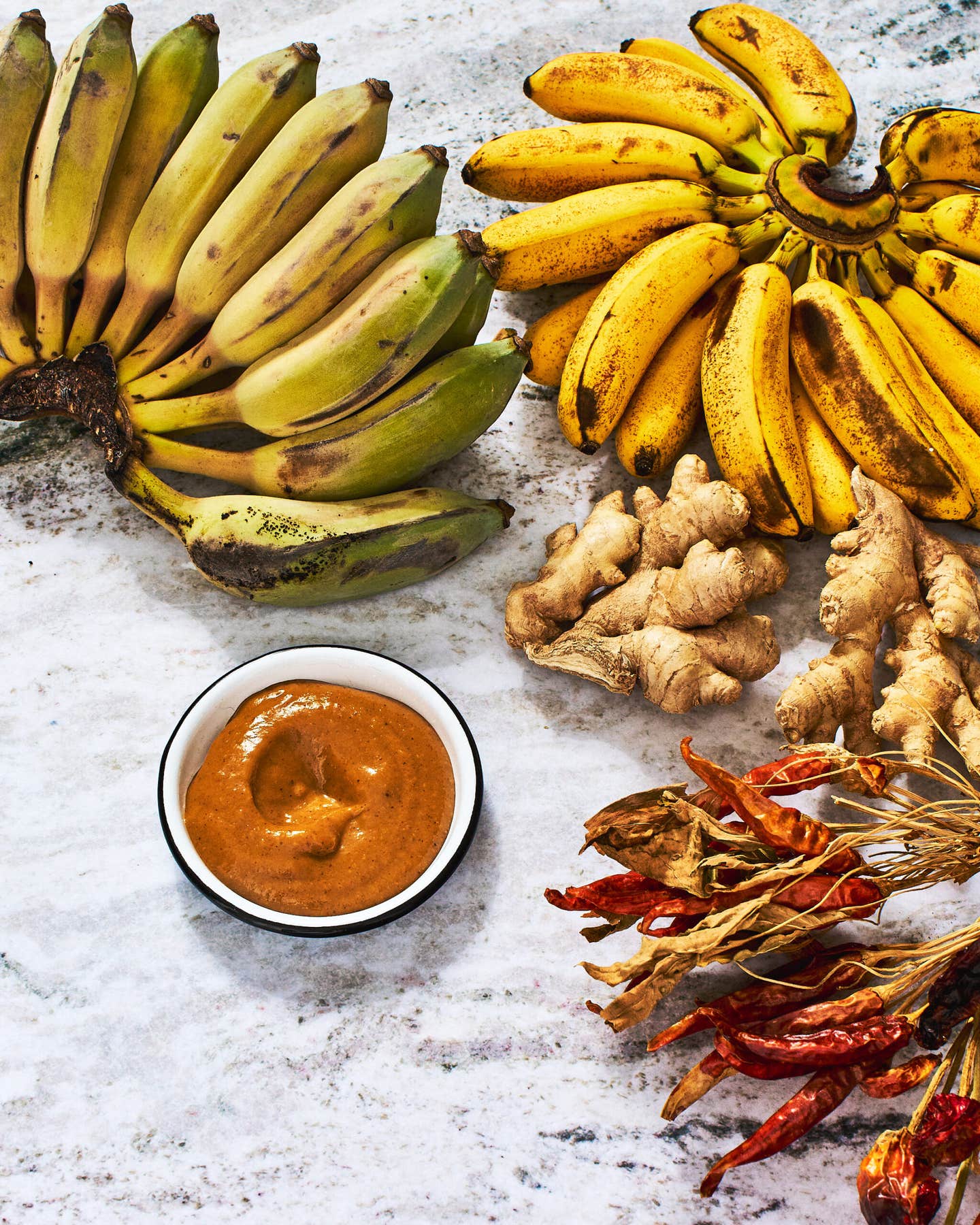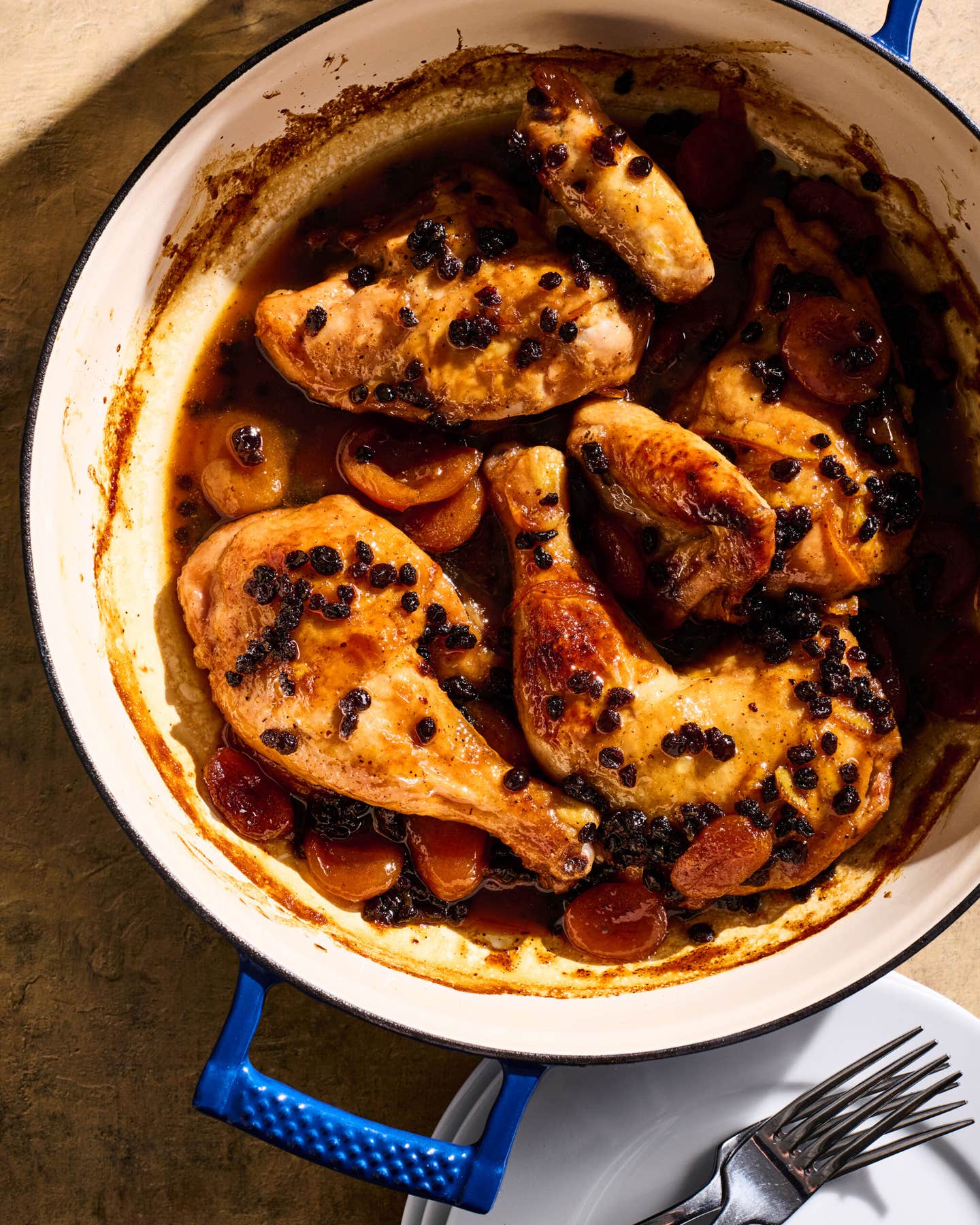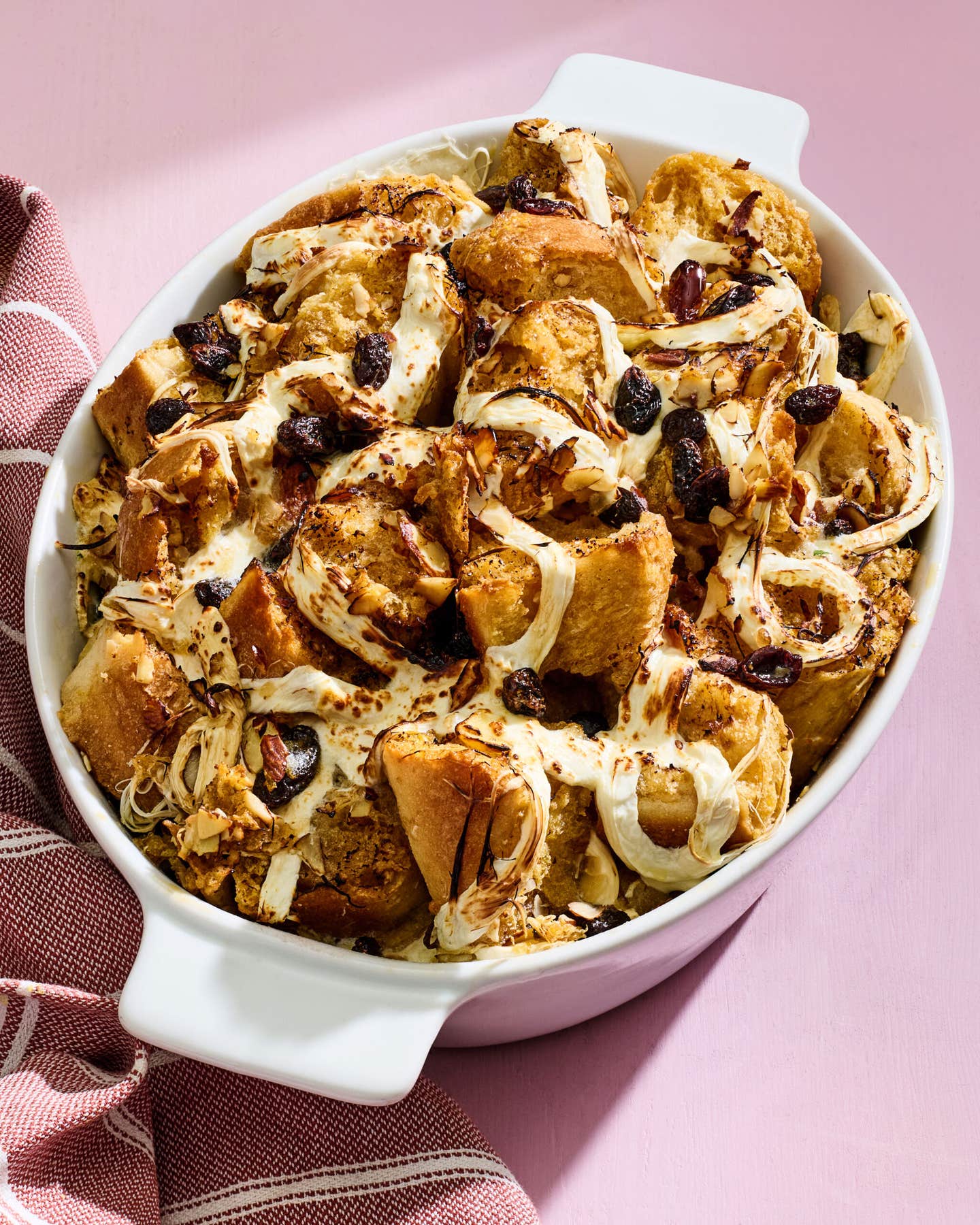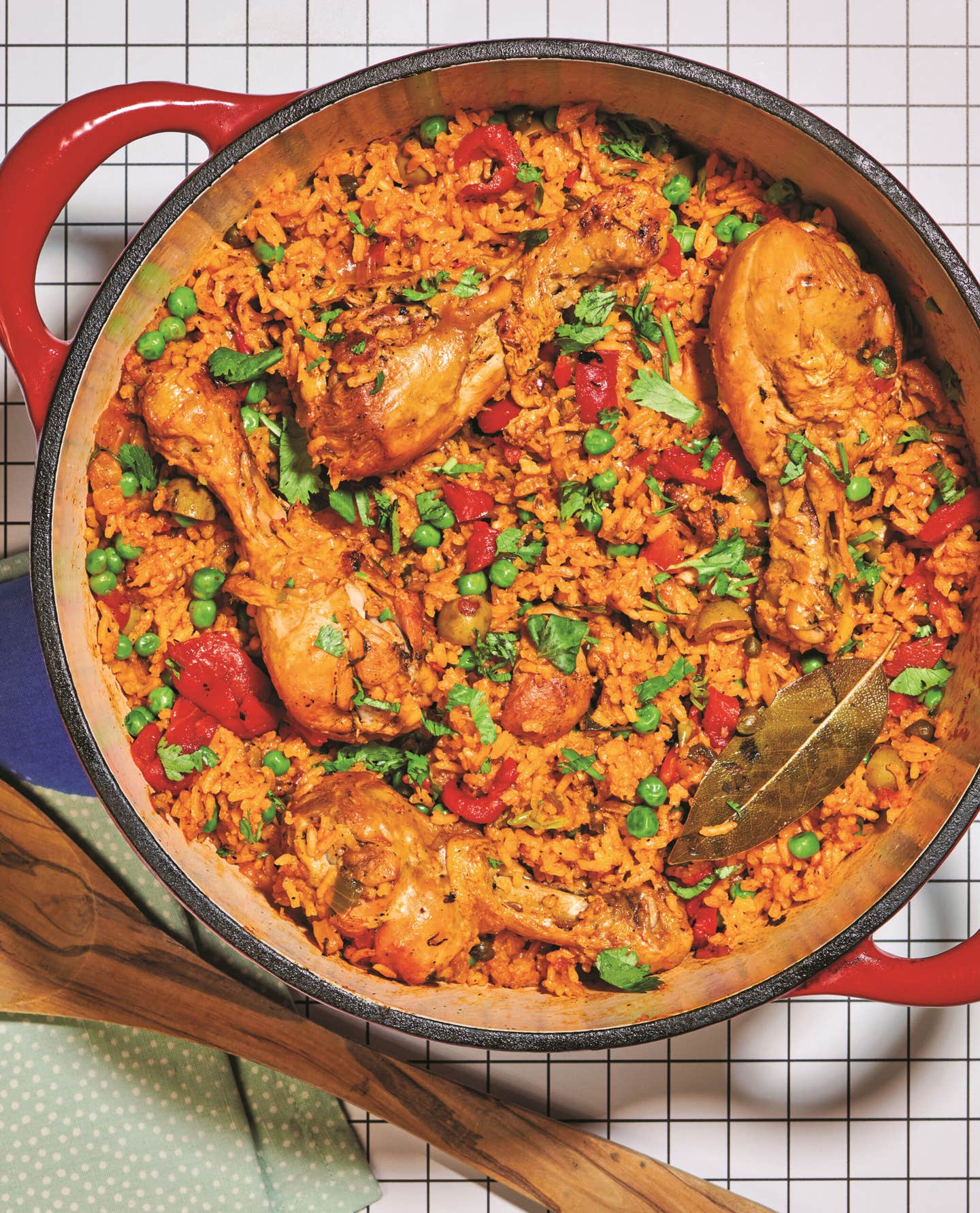
Patience is the key to making this flavorful pâté. Before it is assembled, the ingredients should marinate overnight, and the finished pâté should set for at least a day after it's cooked so that the flavors meld.
Ingredients
- 2 duck breasts (about 1 lb.), trimmed of skin and fat
- 3 cloves garlic
- 2 tbsp. orange liqueur, such as Grand Marnier
- 2 tbsp. extra-virgin olive oil
- 9 fresh or dried bay leaves
- 1 lb. boneless pork shoulder, chilled
- 3⁄4 lb. fatback, chilled
- 1⁄4 lb. chicken livers
- 2 eggs, beaten
- 1 tbsp. chopped thyme leaves plus 8 sprigs
- 1⁄2 tsp. ground cloves
- 1⁄2 tsp. ground ginger
- 1⁄4 tsp. ground nutmeg
- 1⁄4 tsp. piment d'Espelette or paprika
- 4 1⁄2 tsp. kosher salt
- 1⁄3 cup shelled pistachios
- 3 tbsp. dried green peppercorns
- 12–15 slices bacon
ADVERTISEMENTADAD
Instructions
Step 1
Cut the duck breasts into 1⁄2" cubes. Transfer duck, 1 finely chopped clove garlic, orange liqueur, 1 tbsp. of the olive oil, and 3 torn bay leaves to a small bowl; stir to coat the duck pieces. Cover and refrigerate for at least 1 day and up to 3 days, to allow the flavors to come together. (The longer the duck marinates, the better the pâté will taste.) Cut the pork shoulder and the fatback into thin sheets. Cut sheets lengthwise into 1⁄8"-wide strips. Cut strips crosswise into 1⁄8" cubes. Mound the pork and fatback into separate piles on the cutting board and finely chop them by running a chef's knife over the piles several times; transfer pork and fat to bowls and set aside in the refrigerator to let chill.
Step 2
Meanwhile, in the bowl of a food processor, finely chop the remaining garlic. Scrape the sides of the bowl with rubber spatula. Add chicken livers and pulse until puréed. Add reserved pork and fat. In short bursts, pulse until the mixture resembles coarse hamburger meat, about 20 pulses. Transfer pork–liver mixture to a large bowl. Add eggs, chopped thyme, cloves, ginger, nutmeg, piment d'Espelette, and salt. Mix the ingredients together with your hands until well combined. Test the mixture for seasoning by heating remaining olive oil in an 8" skillet over medium-high heat. Transfer a pinch of the mixture to skillet and cook, flipping once, until golden brown, about 3 minutes. Taste; adjust seasoning accordingly. Cover bowl with plastic wrap and refrigerate for at least 1 day and up to 3 days, to allow the meats to cure and the flavors to come together.
Step 3
When you're ready to assemble the pâté, remove bay leaves from duck mixture; discard. Using a spoon, fold duck mixture and any juices from marinade into the forcemeat along with the pistachios and peppercorns; set aside in the refrigerator.
Step 4
Meanwhile, line the bottom of a 1 1⁄2-qt. rectangular terrine mold with 4 evenly spaced thyme sprigs and 3 bay leaves. Place bacon crosswise along the bottom and up the sides of the mold, covering the herbs.
Step 5
Spoon the meat–duck mixture into the terrine mold and gently smooth the top with the back of a spoon. Lay 4 strips bacon lengthwise across the top of the pâté. Cover bacon with remaining thyme sprigs and bay leaves. Cover the top of the pâté with 2 sheets of aluminum foil; crimp foil around edges of the mold to form a tight seal.
Step 6
Heat oven to 325°. Transfer terrine mold to a 9" x 13" baking dish. Transfer dish to middle rack of the oven. Pour in enough boiling water that it reaches 1⁄2" up the sides of the terrine. Bake the pâté until an instant-read thermometer inserted into center reads 158°, about 2 hours. Transfer baking dish to a rack; remove foil. Cut out 2 rectangles of cardboard to fit inside rim of terrine mold. Wrap cardboard rectangles in foil and place them over pâté. Place three 15-oz. soup cans atop cardboard; let sit in water bath for 1 hour; remove. (Weighting makes the pâté easier to slice.) Refrigerate pâté (in its mold) for at least 1 day and up to 4 days. To serve, slide a knife along edges of pâté to loosen it. Invert the pâté onto a cutting board and slide a butter knife along one short edge to free the pâté from the mold. Cut into 3⁄4" slices and serve with baguette, dijon mustard, and cornichons.
- Cut the duck breasts into 1⁄2" cubes. Transfer duck, 1 finely chopped clove garlic, orange liqueur, 1 tbsp. of the olive oil, and 3 torn bay leaves to a small bowl; stir to coat the duck pieces. Cover and refrigerate for at least 1 day and up to 3 days, to allow the flavors to come together. (The longer the duck marinates, the better the pâté will taste.) Cut the pork shoulder and the fatback into thin sheets. Cut sheets lengthwise into 1⁄8"-wide strips. Cut strips crosswise into 1⁄8" cubes. Mound the pork and fatback into separate piles on the cutting board and finely chop them by running a chef's knife over the piles several times; transfer pork and fat to bowls and set aside in the refrigerator to let chill.
- Meanwhile, in the bowl of a food processor, finely chop the remaining garlic. Scrape the sides of the bowl with rubber spatula. Add chicken livers and pulse until puréed. Add reserved pork and fat. In short bursts, pulse until the mixture resembles coarse hamburger meat, about 20 pulses. Transfer pork–liver mixture to a large bowl. Add eggs, chopped thyme, cloves, ginger, nutmeg, piment d'Espelette, and salt. Mix the ingredients together with your hands until well combined. Test the mixture for seasoning by heating remaining olive oil in an 8" skillet over medium-high heat. Transfer a pinch of the mixture to skillet and cook, flipping once, until golden brown, about 3 minutes. Taste; adjust seasoning accordingly. Cover bowl with plastic wrap and refrigerate for at least 1 day and up to 3 days, to allow the meats to cure and the flavors to come together.
- When you're ready to assemble the pâté, remove bay leaves from duck mixture; discard. Using a spoon, fold duck mixture and any juices from marinade into the forcemeat along with the pistachios and peppercorns; set aside in the refrigerator.
- Meanwhile, line the bottom of a 1 1⁄2-qt. rectangular terrine mold with 4 evenly spaced thyme sprigs and 3 bay leaves. Place bacon crosswise along the bottom and up the sides of the mold, covering the herbs.
- Spoon the meat–duck mixture into the terrine mold and gently smooth the top with the back of a spoon. Lay 4 strips bacon lengthwise across the top of the pâté. Cover bacon with remaining thyme sprigs and bay leaves. Cover the top of the pâté with 2 sheets of aluminum foil; crimp foil around edges of the mold to form a tight seal.
- Heat oven to 325°. Transfer terrine mold to a 9" x 13" baking dish. Transfer dish to middle rack of the oven. Pour in enough boiling water that it reaches 1⁄2" up the sides of the terrine. Bake the pâté until an instant-read thermometer inserted into center reads 158°, about 2 hours. Transfer baking dish to a rack; remove foil. Cut out 2 rectangles of cardboard to fit inside rim of terrine mold. Wrap cardboard rectangles in foil and place them over pâté. Place three 15-oz. soup cans atop cardboard; let sit in water bath for 1 hour; remove. (Weighting makes the pâté easier to slice.) Refrigerate pâté (in its mold) for at least 1 day and up to 4 days. To serve, slide a knife along edges of pâté to loosen it. Invert the pâté onto a cutting board and slide a butter knife along one short edge to free the pâté from the mold. Cut into 3⁄4" slices and serve with baguette, dijon mustard, and cornichons.
Keep Reading
Continue to Next Story
ADVERTISEMENTADAD










